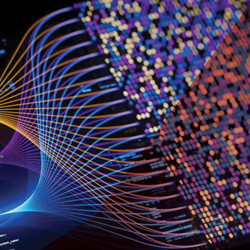Nonlinear Dynamics of Reservoir Computing: Theory, Realization and Application
 Reservoir computing leverages the response of driven dynamic systems for data-driven modeling, time-series prediction, classification, and control. In the past, recurrent neural networks have primarily served as dynamic reservoirs, but recent developments have extended this general approach to a variety of substrates, including passive and active optical systems, electro-optical systems, magnetic systems, memristors, spin wave systems, swarms, skyrmion textures, biological tissue, and quantum systems. A common goal of all these investigations is to improve our theoretical understanding of various types of reservoir computing and to achieve fast and energy-efficient hardware implementations. The performance of this type of machine learning method strongly depends on the dynamic properties of the driven reservoir system for a given input, where generalized synchronization plays an important role in achieving a reproducible and reliable dynamic response.
Reservoir computing leverages the response of driven dynamic systems for data-driven modeling, time-series prediction, classification, and control. In the past, recurrent neural networks have primarily served as dynamic reservoirs, but recent developments have extended this general approach to a variety of substrates, including passive and active optical systems, electro-optical systems, magnetic systems, memristors, spin wave systems, swarms, skyrmion textures, biological tissue, and quantum systems. A common goal of all these investigations is to improve our theoretical understanding of various types of reservoir computing and to achieve fast and energy-efficient hardware implementations. The performance of this type of machine learning method strongly depends on the dynamic properties of the driven reservoir system for a given input, where generalized synchronization plays an important role in achieving a reproducible and reliable dynamic response.
This Special Topic reviews recent advances in the field of reservoir computing with contributions focusing mainly on the close connections between reservoir computing and dynamical systems theory.
Topics covered include, but are not limited to:
- Dynamic principles and theory of reservoir computing
- Reservoir computing using physical systems
- Multistability, multifunctionality, and multiplexing in reservoir computing
- Novel (hardware) implementations of reservoir computing systems
- Physics informed reservoir computing
- Quantum reservoir computing
- Applications in physical, biology, chemistry, economy, etc.
Guest Editors
Andreas Amann, University College Cork, Ireland
Kathy Lüdge, Technische Universität Ilmenau, Germany
Ulrich Parlitz, Max Planck Institute for Dynamics and Self-Organization, Germany
Michael Small, The University of Western Australia, Australia
